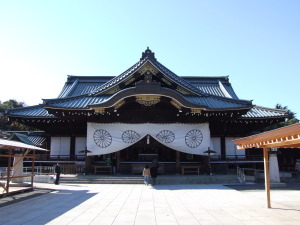Abe sends ritual offering to Yasukuni shrine for war dead
 On the 69th anniversary of Japan’s defeat in World War II, the world’s attention turned to Tokyo, waiting to see whether Prime Minister Shinzo Abe would pay homage at the Yasukuni Shrine or not. The Shrine memorializes Japan’s almost 2.5 million war dead since the Meiji Restoration, including 14 people convicted of class-A war crimes during WWII. It is seen by South Korea and China – the victims of Japan’s brutal colonization and occupation during the Pacific War – as a symbol of Japan’s imperialistic past and a barometer for Japan’s future militaristic intentions. South Korea and China protest whenever a Japanese official visits the Shrine, and it is a sticking point in Japan improving its relations with regional states. Fortunately for the US, and everyone wishing for greater peace and stability in the region, Mr. Abe did not personally go to Yasukuni on August 15, though he did send an offering with an aide.
On the 69th anniversary of Japan’s defeat in World War II, the world’s attention turned to Tokyo, waiting to see whether Prime Minister Shinzo Abe would pay homage at the Yasukuni Shrine or not. The Shrine memorializes Japan’s almost 2.5 million war dead since the Meiji Restoration, including 14 people convicted of class-A war crimes during WWII. It is seen by South Korea and China – the victims of Japan’s brutal colonization and occupation during the Pacific War – as a symbol of Japan’s imperialistic past and a barometer for Japan’s future militaristic intentions. South Korea and China protest whenever a Japanese official visits the Shrine, and it is a sticking point in Japan improving its relations with regional states. Fortunately for the US, and everyone wishing for greater peace and stability in the region, Mr. Abe did not personally go to Yasukuni on August 15, though he did send an offering with an aide.
Last December, Mr. Abe stirred up a wave of controversy when he visited the Shrine on the one-year anniversary of his second election. Though Yasukuni Shrine visits frequently embitter Japan’s relations with South Korea and China, the incident was particularly damaging for Japan because it evoked a rare response from the US. The US Embassy in Tokyo stated through its website that “The United States is disappointed that Japan’s leadership has taken an action that will exacerbate tensions with Japan’s neighbors.” Though Mr. Abe’s nationalist penchant is well-known, most observers had hoped that his focus on the economic recovery would keep such antagonistic actions at bay. Mr. Abe maintained his high approval ratings and popularity with his focus on improving the lives of everyday Japanese. However, his more recent actions, such as changing the interpretation of Article 9, the Peace Clause, to expand the definition of “collective self-defense”, increasing defense spending, lifting the arms exports ban, appointing four conservatives to Japan Broadcasting Corporation (NHK)‘s board of governors, and declaring that he was “moved” by Eien no Zero, a film that glorifies kamikaze pilots, may reflect a shift away from his previous emphasis on Abenomics.
When he was campaigning in the 2012 election, Mr. Abe had stated that he regretted never visiting the Shrine while he was a prime minister in 2006-07. To some extent, Mr. Abe’s December visit was motivated by his personal desire to “free” Japan from its humiliating past, but domestic political considerations play an important role as well. Though most of the Japanese public opposes shrine visits by the prime minister, it is a cheap and easy way for conservatives to score points with their base. While Japanese politicians defend their visits as domestic matters that they undertake in their private capacity (even Mr. Abe’s donation this time was ostensibly made as the head of the Liberal Democratic Party and not as the prime minister of Japan), they need to understand that their actions have regional repercussions – whether they acknowledge it or not.
The greatest irony, perhaps, is that Mr. Abe understands this perfectly well. He may have deliberately chosen the timing of the December visit because relations with both China and South Korea were so bad that there was not as much at stake. South Korean President Park Gun-Hye had already declined to meet with Mr. Abe; and China also ruled out a summit with Mr. Abe following this incident. However, the odds of a meeting between Mr. Abe and Chinese President Xi Jinping anytime soon were already rather slim due to tensions between Japan and China had flaring up over China’s unilateral declaration of an Air Defense Identification Zone a month earlier that encompassed the disputed Senkaku/Diaoyu islands.
Abe’s decision to not visit the Shrine can be taken as a sign that Japan’s regional relations are improving. Improvement means that there is more for Japan to lose if it acts too provocatively. In March, Abe pledged to not revise the Kono Statement apologizing for the use of comfort women. Also in March, Mr. Abe and Ms. Park met for the first time on the sidelines of the nuclear summit at The Hague in a meeting brokered by US President Obama. Relations were improving with China as well when Chinese emissary Hu Deping met secretly with Mr. Abe in early April. There was also a decrease in the number of Chinese excursions into disputed waters. As The Economist speculated, “The shift [to rein in the far-right] could … be lasting. The LDP’s senior foreign-policy moderates are furious that Mr. Abe has acted to please his right-wing supporters at the expense of Japan’s diplomatic standing.” Mr. Abe has acted less provocatively – but the offering and note still endangers Japan’s relations with China and South Korea. Though Mr. Abe may have learned his lesson by now, one can only hope that other government officials also take heed. In a time of great geopolitical shifts, politicians can no longer afford to view any of their actions as purely domestic matters.
